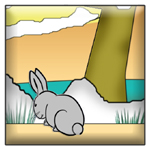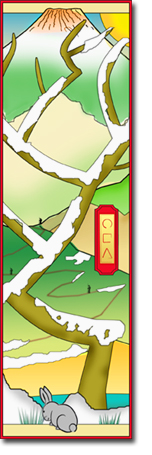On The Way: The Daily Zen Journal
Opening the Hand of Thought – Part 2
Kosho Uchiyama (1912-1988)

When we let go of our conceptions, there is no other possible reality than what is right now; in that sense, what is right now and here is absolute, it’s undeniable. Not only that, this undeniable reality is at the same time the reality of life that is fundamentally connected to everything in the universe. This is undeniable reality. The truth to be derived from this is that right now is all-important.
Dwelling here and now in this reality, letting go of all the accidental things that arise in our minds, is what I mean by “opening the hand of thought.”
When we think of “now” in the ordinary sense, we assume that there is a linear flow of time from the past into the present and forward into the future. Actually, it isn’t that way at all. Actually, all that there really is, is now.
As the scenery of the present, however, there is a past, present, and a future. Let me say that again: within the present, there is a past, a present, and a future. The past and future are real and alive only in the present. This concept of time in Buddhist thought is very important.
It is different from the notion in Western philosophy that time flows from the past, into the present, and on into the future in a linear way. According the Buddhist teachings, it doesn’t quite work that way. The past, present, and future are all contained within the present.
We have to realize that there is nothing outside of the present. Quite often people become shackled by the past. Believing that you came from a prominent family with a lot of money and feeling ashamed about your present condition is nothing more than being shackled to a conception of the past. Thinking that you have to repair a house because it appears to be old is only an idea; thinking that you have to fix it to preserve it unchanged is also just an idea.

Likewise, to feel that you have to do something like become famous in the future is only to be shackled by your ambitious ideas about the future. What is most important is right now.
But again, within that “now” we have past experiences. Within the present, we have past experiences and a direction toward the future that we face. We have to vivify our past experiences and face toward the future—all within the present. Only if we master the realities of the past can they function vividly and smoothly in the present.
Only if we have learned how to drive a car can we effectively use one to go somewhere. Doing exactly that is called genjo koan, the koan of life becoming life. Genjo is the present becoming the present.

Whether we realize it or not we are always living out a life that is connected to everything in the universe. But when I say that, I’m not talking about someone else’s life, or life in general separate from myself. The life that runs through everything in the universe is me.
I don’t mean me as an ego; I mean my self in the true sense, the universal self. It is the foundation of all life experiences. Eihei Dogen Zenji referred to the reality of life in this sense as the jinissai jiko, or “the self that extends through everything in the universe.”
This self is not some fixed body, it’s constantly changing. Every time we take a breath we’re changing. Our consciousness is always changing, too. All the chemical and physical processes in our body are also constantly changing. And yet, everything temporarily takes a form. This is our true self, jiko. This is the real or universal self, or the reality of life, as I prefer to call it. Whatever way you put it, I am here only because my world is here.

When I die, my world dies with me. In other words, I wasn’t born into a world that was already here before me, I do not live simply as one individual among millions of other individuals., and I do not leave everything behind to live on after me.
People go through life thinking of themselves as members of a group or society. However, this isn’t how we really live. Actually, I bring my own world into existence, live it out, and take it with me when I die.
I can’t stress enough how essential it is to look very, very carefully at this universal self that runs through everything in the universe. You live together with your world. Only when you thoroughly understand this will everything in the world settle as the self pervading all things.
As Buddhists, this is our vow or life direction. We vow to save all sentient beings so that this self may become even more itself. This is the direction we continuously face.
Shakyamuni Buddha said it this way, “All worlds are my world and all sentient beings—people, things, and situations—are my children.” Dogen Zenji’s expression roshin, nurturing mind or attitude, came out of this. My way of expressing this is “everything I encounter is my life” —deau tokoro waga seimei.

That is why our most fundamental attitude must be “just doing,” or “doing nothing but this.” (shikan). It’s not a matter of thinking correctly about life. Thinking about life simply isn’t enough.
Our life is whatever we are encountering right now, and our practice is shikantaza, which is literally “just sitting.” More broadly it means to put our energy into settling everything in our world here and now, where we really live.
Excerpted from Opening the Hand of Thought – Foundations of Zen Buddhist Practice – Kosho Uchiyama 2004





When I first read the title, “Opening the Hand of Thought,” I immediately was reminded of how many principles in Zen are best illustrated through the line of a poem or an image from one of the numerous stories. And in that one image is contained a gem of truth that doesn't require a lot of explanation.
These images or phrases are so evocative, it is as if they are directly transmitting to us across the centuries. The feeling of opening one's hand is a manifestation of non attachment. We hold on tightly to an idea or point of view only to also tighten our experience as an individual ego; we let go of the idea, relax and immediately enter a much larger room.
There are perhaps several lines in the piece where your mind may stop…
Whether we realize it or not we are always living out life that is connected to everything in the universe.
It could take a lifetime to realize that, or it could take an instant.
Journeying with you,
Elana, Scribe for Daily Zen